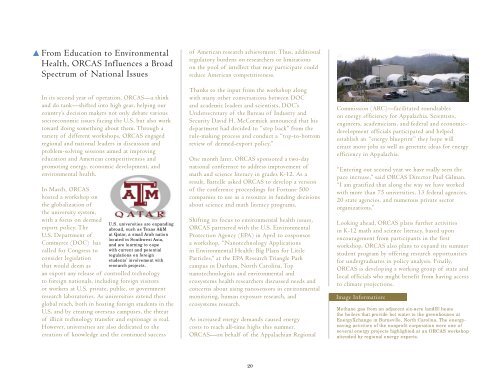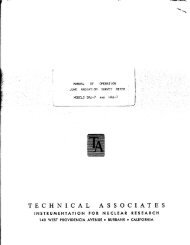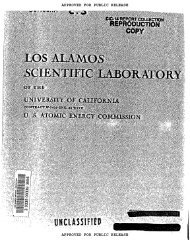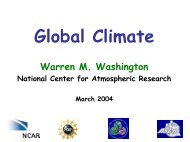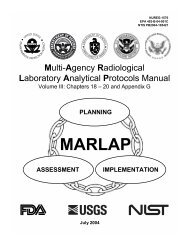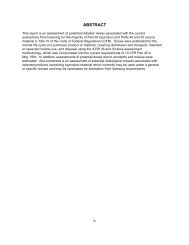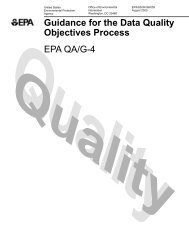Oak Ridge Associated Universities 2006 Annual Report
Oak Ridge Associated Universities 2006 Annual Report
Oak Ridge Associated Universities 2006 Annual Report
You also want an ePaper? Increase the reach of your titles
YUMPU automatically turns print PDFs into web optimized ePapers that Google loves.
From Education to Environmental<br />
Health, ORCAS Influences a Broad<br />
Spectrum of National Issues<br />
In its second year of operation, ORCAS—a think<br />
and do tank—shifted into high gear, helping our<br />
country’s decision makers not only debate various<br />
socioeconomic issues facing the U.S. but also work<br />
toward doing something about them. Through a<br />
variety of different workshops, ORCAS engaged<br />
regional and national leaders in discussion and<br />
problem-solving sessions aimed at improving<br />
education and American competitiveness and<br />
promoting energy, economic development, and<br />
environmental health.<br />
In March, ORCAS<br />
hosted a workshop on<br />
the globalization of<br />
the university system,<br />
with a focus on deemed<br />
export policy. The<br />
U.S. Department of<br />
Commerce (DOC) has<br />
called for Congress to<br />
consider legislation<br />
that would deem as<br />
U.S. universities are expanding<br />
abroad, such as Texas A&M<br />
at Qatar, a small Arab nation<br />
located in Southwest Asia,<br />
and are learning to cope<br />
with current and potential<br />
regulations on foreign<br />
students’ involvement with<br />
research projects.<br />
an export any release of controlled technology<br />
to foreign nationals, including foreign visitors<br />
or workers at U.S. private, public, or government<br />
research laboratories. As universities extend their<br />
global reach, both in hosting foreign students in the<br />
U.S. and by creating overseas campuses, the threat<br />
of illicit technology transfer and espionage is real.<br />
However, universities are also dedicated to the<br />
creation of knowledge and the continued success<br />
of American research achievement. Thus, additional<br />
regulatory burdens on researchers or limitations<br />
on the pool of intellect that may participate could<br />
reduce American competitiveness.<br />
Thanks to the input from the workshop along<br />
with many other conversations between DOC<br />
and academic leaders and scientists, DOC’s<br />
Undersecretary of the Bureau of Industry and<br />
Security David H. McCormick announced that his<br />
department had decided to “step back” from the<br />
rule-making process and conduct a “top-to-bottom<br />
review of deemed-export policy.”<br />
One month later, ORCAS sponsored a two-day<br />
national conference to address improvement of<br />
math and science literacy in grades K-12. As a<br />
result, Battelle asked ORCAS to develop a version<br />
of the conference proceedings for Fortune 500<br />
companies to use as a resource in funding decisions<br />
about science and math literacy programs.<br />
Shifting its focus to environmental health issues,<br />
ORCAS partnered with the U.S. Environmental<br />
Protection Agency (EPA) in April to cosponsor<br />
a workshop, “Nanotechnology Applications<br />
in Environmental Health: Big Plans for Little<br />
Particles,” at the EPA Research Triangle Park<br />
campus in Durham, North Carolina. Top<br />
nanotechnologists and environmental and<br />
ecosystems health researchers discussed needs and<br />
concerns about using nanosensors in environmental<br />
monitoring, human exposure research, and<br />
ecosystems research.<br />
As increased energy demands caused energy<br />
costs to reach all-time highs this summer,<br />
ORCAS—on behalf of the Appalachian Regional<br />
Commission (ARC)—facilitated roundtables<br />
on energy efficiency for Appalachia. Scientists,<br />
engineers, academicians, and federal and economicdevelopment<br />
officials participated and helped<br />
establish an “energy blueprint” they hope will<br />
create more jobs as well as generate ideas for energy<br />
efficiency in Appalachia.<br />
“Entering our second year we have really seen the<br />
pace increase,” said ORCAS Director Paul Gilman.<br />
“I am gratified that along the way we have worked<br />
with more than 75 universities, 13 federal agencies,<br />
20 state agencies, and numerous private sector<br />
organizations.”<br />
Looking ahead, ORCAS plans further activities<br />
in K-12 math and science literacy, based upon<br />
encouragement from participants in the first<br />
workshop. ORCAS also plans to expand its summer<br />
student program by offering research opportunities<br />
for undergraduates in policy analysis. Finally,<br />
ORCAS is developing a working group of state and<br />
local officials who might benefit from having access<br />
to climate projections.<br />
Image Information:<br />
Methane gas from an adjacent six-acre landfill heats<br />
the boilers that provide hot water to the greenhouses at<br />
EnergyXchange in Burnsville, North Carolina. The energysaving<br />
activities of the nonprofit corporation were one of<br />
several energy projects highlighted at an ORCAS workshop<br />
attended by regional energy experts.<br />
20


